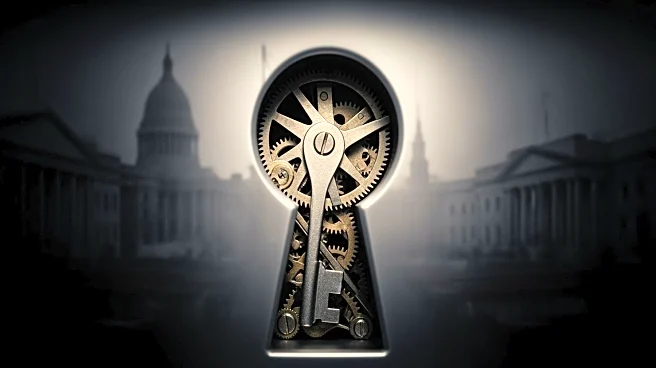What's Happening?
The US House of Representatives is preparing to vote on a spending bill aimed at ending the longest-ever government shutdown. The Senate has already passed the bill, but the House faces several obstacles
before it can clear Congress and be signed into law. Key issues include healthcare provisions, with Democrats pushing for tax credits to make health insurance more affordable for 24 million Americans. Senate Republicans have agreed to a vote on these subsidies in December, but House Speaker Mike Johnson has not committed to a similar vote. The House Freedom Caucus is advocating for a budget that extends beyond January and addresses spending concerns. Republicans hold a narrow majority in the House, and unity is crucial to pass the budget without Democratic support.
Why It's Important?
The outcome of the House vote is critical for ending the government shutdown, which has significant implications for federal operations and public services. The healthcare subsidies are a contentious issue, with potential impacts on insurance premiums and political campaigns. If Republicans fail to address these subsidies, it could lead to increased premiums, providing Democrats with a campaign issue for the upcoming midterm elections. The budget decision also affects the national debt, with concerns about continued spending increases. The political dynamics within both parties, including divisions among Democrats and fiscal hawks among Republicans, will influence the vote and future negotiations.
What's Next?
The House vote is expected this week, with Republicans needing to maintain unity to pass the budget. If successful, the bill will proceed to President Trump for signing into law. The healthcare subsidies remain a critical issue, with potential negotiations on income caps and direct payments to individuals. The political landscape may shift as Democrats leverage recent election victories and internal party tensions. The outcome will also impact future budget discussions, particularly regarding long-term spending and debt management.
Beyond the Headlines
The government shutdown has broader implications, including travel disruptions and public frustration. The political maneuvering around the budget highlights strategic tensions within both parties, with potential long-term effects on party unity and policy priorities. The healthcare debate underscores the ongoing challenges in balancing fiscal responsibility with public welfare, a theme likely to persist in future legislative sessions.









